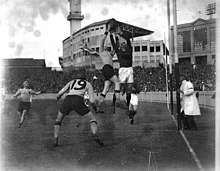 Players contest a mark at the Australian Football Carnival, in 1933, at the Sydney Cricket Ground. The teams are New South Wales and Western Australia. | |
| Sport | Australian rules football |
|---|---|
| Type | Representative football |
| First meeting | 1879 |
| Broadcasters | |
| Statistics | |
| Most wins | Victoria (17) |
Representative matches in Australian rules football are matches between representative teams played under the Australian rules, most notably of the colonies and later Australian states and territories. Senior intercolonial representative matches took place from 1879 to the turn of the 20th century. For most of the 20th century, the absence of a national club competition in Australia meant that interstate matches were regarded as important events.
Interstate matches were, in most cases, sanctioned and coordinated by the (ANFC), which organised every national championship series from the first-ever national carnival, the Jubilee Australasian Football Carnival in 1908 with the exception of the last-ever series: the 1993 State of Origin Championships, which was run by the AFL Commission. The series took place on approximately three-yearly intervals between 1908 and 1993; these were usually a fortnight-long tournament staged in a single host city, although some – particularly those played in the 1980s – were based on the results of matches played in different cities throughout the year. Between 1937 and 1988, the player judged the best at each of these carnivals was awarded the Tassie Medal; and between 1953 and 1988, the selection of All Australian Teams was based on the player's performance during Australian Football Carnivals, and the team was named after each carnival concluded.
Until June 1977, interstate Australian rules football games were played by teams representing the major football leagues or organisations, with players representing the state or territory they were playing in at the time. From October, 1977 until May, 1999, players were selected for their states under partial or full State of Origin selection rules. Football historian John Devaney has argued that "some of the state of origin contests which took place during the 1980s constituted arguably the finest expositions of the game ever seen".[1]
Non-state representative matches sanctioned by the AFL feature AFL recognised teams including the Indigenous All-Stars (since 1983), International Rules Series (played under International Rules since 1984 featuring All-Australian selection from 1998-2004 and 2014-2017), Australian Football International Cup (since 2005), AFL National Academy (since 2007), AFL Oceania and AFL Asia (since 2008) and AFL Europe (since 2010).
There have been no regular interstate representative matches featuring players from the fully professional Australian Football League since 1999. Representatives matches continue to be played annually between teams representing the state or territorial leagues at the second tier or below. One senior women's State of Origin match was played in 2017. Representative matches are played at underage level as part of the men's and women's Underage National Championships, notably the AFL Under-19 Championships and AFL Women's Under-18 Championships.
Throughout its pre–State of Origin history, Victoria, as represented by the Victorian Football League, was the dominant state in representative football, winning 16 of the 19 carnivals up until 1975. Competition was more even during the nine competitions held in the State of Origin selection era, with championships shared among Western Australia (4), South Australia (3) and Victoria (2).
- ^ "Interstate Football". AustralianFootball.com.